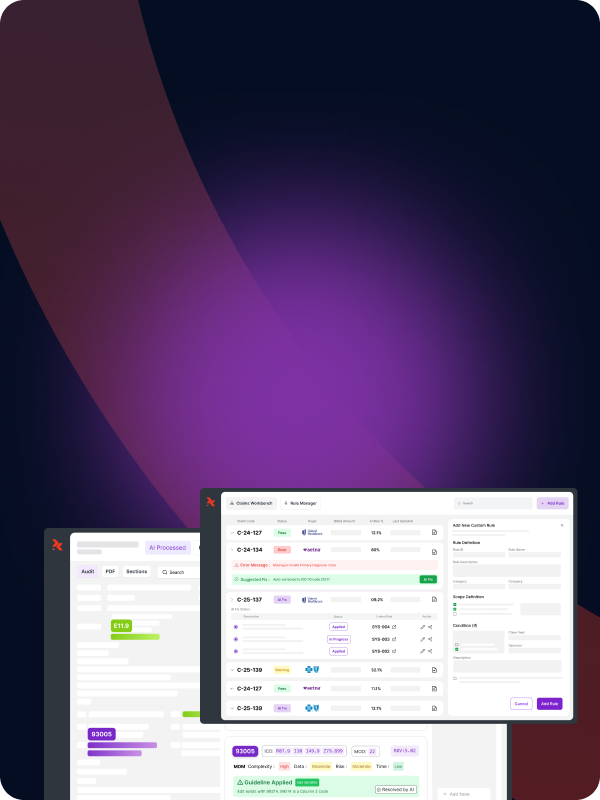.webp)
The Role of Artificial Intelligence in Revolutionizing Medical Coding

Healthcare is an ever-evolving industry, and recent advancements in technology are driving significant changes in how providers manage their operations. One area experiencing transformative innovation is medical coding. With the introduction of artificial intelligence (AI) into coding processes, providers can now handle the immense flow of clinical data more efficiently and accurately. This blog explores how AI is becoming an indispensable tool in medical coding and its implications for the future of healthcare revenue cycle management.
The Growing Need for Innovation in Medical Coding
Medical coding is a critical component of the healthcare revenue cycle. It involves translating clinical documentation into standardized codes used for billing, insurance claims, and statistical analysis. Accurate coding is essential not only for financial reasons but also for maintaining the integrity of patient data. However, traditional coding methods are labor-intensive, requiring coders to manually review and interpret vast amounts of clinical data. This process is prone to errors, leading to claim denials, delays in reimbursement, and even compromised patient care.
As the volume of healthcare data continues to grow, the need for more efficient and accurate coding solutions has become increasingly apparent. Providers are under pressure to manage this data influx while maintaining high standards of accuracy and compliance. This is where AI comes into play, offering a promising solution to the challenges faced by medical coders and auditors.
AI-Powered Medical Coding: Enhancing Efficiency and Accuracy
Artificial intelligence, particularly machine learning, is revolutionizing the way medical coding is performed. AI-powered coding solutions analyze large datasets to identify patterns and make predictions, allowing for more accurate and efficient coding. These technologies can quickly sift through hundreds of pages of medical records, identifying relevant information and suggesting appropriate codes. This not only reduces the workload for coders but also enhances the overall accuracy of the coding process.
One of the key advantages of AI in medical coding is its ability to automate routine tasks. By taking over repetitive, time-consuming activities, AI allows coders to focus on more complex cases that require human expertise. This synergy between AI and coders is crucial for maximizing efficiency and ensuring that coding remains both accurate and compliant with the latest standards.
Workflow Optimization Through AI
AI's impact on medical coding extends beyond automation. It also plays a significant role in optimizing workflows. Traditional coding processes often involve multiple steps, including reviewing clinical charts, entering codes into different systems, and verifying the accuracy of the coding. These steps can be streamlined using AI-powered workflow software, which reduces redundancy and minimizes the risk of errors.
For example, AI can assist in populating codes into the appropriate systems with minimal manual intervention. This not only speeds up the coding process but also ensures that the data is consistently accurate across different platforms. By reducing the number of clicks and manual entries required, AI-powered workflows can significantly enhance productivity and allow coders to handle larger volumes of work without sacrificing quality.
The Human Element: AI as a Support Tool, Not a Replacement
While AI offers numerous benefits for medical coding, it is important to recognize that it is not a replacement for human coders. Medical coding is a complex process that often involves interpreting nuanced clinical information and making judgment calls. AI can assist by providing suggestions and automating routine tasks, but the final decision still rests with the coder.
This collaborative approach between AI and human coders creates a positive feedback loop. As coders interact with AI, they provide valuable input that helps refine the algorithms, making the AI more accurate over time. This partnership enables coders to take on more challenging cases, ultimately improving the overall quality of coding and reducing the likelihood of errors.
Ensuring Transparency and Accountability
For AI to be effective in medical coding, it must operate transparently. Coders need to be able to verify that the AI-generated codes accurately reflect the clinical documentation. This means that AI systems should not function as "black boxes" but rather as tools that coders can interact with and validate.
Ensuring transparency also involves educating coders on how to use AI effectively. Coders should be trained to understand the capabilities and limitations of AI, enabling them to use it as a reliable support tool rather than relying on it blindly. By fostering this understanding, healthcare organizations can build trust in AI systems and encourage their widespread adoption.
The Future of AI in Medical Coding and Auditing
The integration of AI into medical coding is not just a passing trend; it is a necessary evolution to keep pace with the growing demands of the healthcare industry. As the population ages and more patients seek medical care, the volume of claims will continue to rise. AI offers a scalable solution that allows healthcare providers to manage this increased workload without compromising on accuracy or efficiency.
Addressing the Workforce Challenge
The healthcare industry is currently facing a shortage of skilled medical coders. Training new coders is time-consuming and expensive, and many healthcare organizations struggle to fill these critical roles. AI can help alleviate this burden by making existing coders more efficient and productive. By automating routine tasks and assisting with complex coding decisions, AI allows coders to handle more work in less time, reducing the need for additional hires.
Furthermore, AI can serve as a valuable training tool for new coders. By providing real-time feedback and guidance, AI can help new coders learn the ropes more quickly and with greater confidence. This not only accelerates the training process but also ensures that new coders are well-equipped to handle the demands of the job.
Reducing Burnout and Enhancing Job Satisfaction
Burnout is a significant issue in the medical coding profession, driven by the high volume of work and the pressure to maintain accuracy. AI can help reduce burnout by taking over the most repetitive and mundane tasks, allowing coders to focus on more engaging and intellectually stimulating work. This can lead to greater job satisfaction and improved retention rates among coders.
In addition to reducing burnout, AI can also improve the overall quality of life for coders by offering more flexible work arrangements. With AI-powered tools, coders can work remotely and still maintain high levels of productivity and accuracy. This flexibility is especially valuable in today's increasingly digital work environment.
Implementing AI in Medical Coding: Best Practices for Success
The successful implementation of AI in medical coding requires more than just the right technology; it also requires a strategic approach to change management. Healthcare organizations need to ensure that their staff is ready to embrace AI and that they have the necessary support to make the transition smooth.
Building Digital Maturity
Before implementing AI, healthcare organizations must assess their current level of digital maturity. This involves evaluating their existing technology infrastructure and identifying any gaps that need to be addressed. Organizations that are still reliant on manual processes or outdated systems may need to invest in upgrades before they can fully leverage the benefits of AI.
Digital maturity also involves fostering a culture of innovation and continuous improvement. Staff should be encouraged to experiment with new technologies and to provide feedback on how AI can be used to improve their workflows. By creating an environment where innovation is valued, healthcare organizations can ensure that they stay ahead of the curve in medical coding and other areas of the revenue cycle.
Providing Ongoing Training and Support
Training is a critical component of any AI implementation. Coders need to be trained not only on how to use the AI tools but also on how to integrate them into their existing workflows. This training should be ongoing, with regular updates as the technology evolves and new features are introduced.
In addition to training, healthcare organizations should provide ongoing support to their staff. This can include access to technical experts who can troubleshoot issues, as well as peer support networks where coders can share tips and best practices. By providing this support, organizations can help their staff feel more confident and comfortable using AI, leading to higher adoption rates and better outcomes.
Emphasizing Change Management
Implementing AI in medical coding is a significant change, and like any change, it needs to be managed carefully. Healthcare organizations should have a clear change management plan in place, with specific goals and milestones for the AI implementation. This plan should include communication strategies to keep staff informed and engaged throughout the process.
Change management also involves addressing any concerns or resistance that staff may have about AI. This can be done through open dialogue, where staff are encouraged to express their concerns and ask questions. By addressing these concerns head-on, healthcare organizations can build trust in AI and ensure that the implementation is successful.
Conclusion: AI as a Catalyst for Transformation in Medical Coding
Artificial intelligence is poised to transform the field of medical coding, offering new levels of efficiency, accuracy, and scalability. By automating routine tasks and supporting coders in their decision-making, AI can help healthcare organizations manage the growing volume of clinical data and improve the overall quality of care.
However, the success of AI in medical coding depends on its implementation. Healthcare organizations must take a strategic approach, focusing on building digital maturity, providing ongoing training and support, and managing change effectively. By doing so, they can harness the full potential of AI and position themselves for success in the increasingly competitive and complex healthcare landscape.
RapidClaims is at the forefront of this transformation, offering AI-powered coding solutions that streamline processes, enhance accuracy, and reduce costs. As healthcare providers continue to navigate the challenges of the revenue cycle, RapidClaims remains committed to driving innovation and delivering value through cutting-edge technology.
%201.png)









